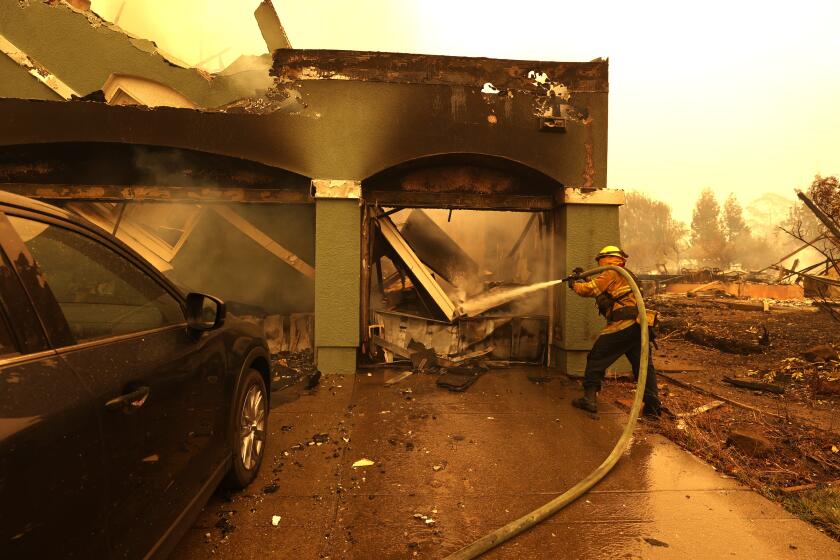Farmers Insurance lays off 2,400 workers as insurers pull back from California

- Share via
Farmers Insurance, one of the nation’s largest property and casualty insurers, is laying off 2,400 workers, representing 11% of its total workforce.
The Los Angeles-based company cited a need to reduce operational costs and focus on “long-term sustainable profitability” in an announcement Monday to explain the job cuts.
This has been a chaotic year for the California insurance market, and this isn’t the first dramatic move that Farmers, the second-largest home and auto insurer in California, has made in recent months.
In July, the company announced that it was not planning on accelerating its growth in the state, and would keep writing new policies at the same pace as before. In a typical year, this would not constitute news — but in 2023, it amounted to a shot across the bow for homeowners, builders and state regulators.
State Farm, the top home insurer in the state, had announced in May that it was hitting pause on writing new home insurance policies in the state, saying that rising construction costs from inflation, ballooning reinsurance fees and growing wildfire risks were making it difficult to add more policies. Allstate, sixth largest in the state, hit pause last year. Farmers’ announcement was an admission that it didn’t intend to fill the void left by its competitors’ pullback.
As State Farm and Allstate hit pause on writing new policies in California, Farmers says it won’t pick up the pace.
“Given the existing conditions of the insurance industry and the impact they are having on our business, we need to take decisive actions today to better position Farmers for future success,” Raul Vargas, president and chief executive of Farmers Group, said in the layoff announcement Monday. “As our industry continues to face macroeconomic challenges, we must carefully manage risk and prudently align our costs with our strategic plans for sustainable profitability.”
The “existing conditions” and “macroeconomic challenges” that Vargas refers to are the same rising costs for reconstruction and risk of severe weather events, including fires, floods and tropical storms, that State Farm pointed to earlier this year. Those factors also have driven up the costs of the reinsurance policies that insurance companies take out to cover their own losses in case of major catastrophic events.
Farmers also said it would stop selling new homeowners policies in Florida earlier this year, and plans to pull back further in that state, according to reporting by Insurance Journal.
Despite these negative trends, Farmers has been faring better than most of its competitors in California. State Farm’s home and auto lines lost more than $2 billion in the first three months of 2023, with $1.8 billion in losses coming from its car insurance division alone. Farmers, by comparison, lost about $150 million in the same period.
While the major players in California insurance have pulled back from the market, insurance industry groups have been clamoring for reforms to the state’s regulatory system. Since 1988, when California voters approved Proposition 103, insurance companies have only been allowed to increase their rates with the approval of the California Department of Insurance, currently led by Insurance Commissioner Ricardo Lara, according to a strict set of transparency and financial requirements.
Lawmakers in Sacramento have taken notice of the situation in the market — and the industry’s arguments.
California’s biggest seller of homeowners insurance says regulations and wildfires make new policies a financial loser. But there are reasons to question that explanation.
The state Senate Republican Caucus released a public letter to the insurance commissioner last week stating that the “insurance industry is broken” and echoing the industry talking points that companies should be able to use new fire models to set higher rates for homeowners in high-fire-risk zones, pass along reinsurance costs to policyholders and generally speed up the rate increase approval process. Democratic lawmakers, who control the state government, are discussing reforms along similar lines, according to reporting by Politico.
Consumer Watchdog, the nonprofit consumer advocacy group that led the Proposition 103 ballot campaign, called the potential changes a “multi-billion dollar bailout” of the insurance industry in a statement Monday. Harvey Rosenfield, founder of the group, added that “insurance companies are trying to exploit a crisis to get deregulation they have sought for 35 years.”
More to Read
Inside the business of entertainment
The Wide Shot brings you news, analysis and insights on everything from streaming wars to production — and what it all means for the future.
You may occasionally receive promotional content from the Los Angeles Times.













